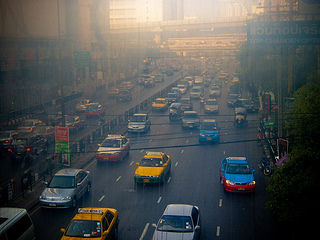This is a continuation from the post, What Now? (Part 2)
Recently, changes in the economic structure in Europe and other parts of the world have caused business interests to think on a more global scale. Technology has made this a very small planet indeed, and has forced many in the business world to change their way of thinking. Changes in transportation now allow us to travel anywhere in the world in hours while advances in communication make is possible for us to communicate around the world while driving down the road in our car.
Because we are no longer isolated from one another, activities (economic, environmental, social, and cultural) in one part of the world can have an immediate impact in far flung reaches of the planet. A decade ago, it was commonly thought that resources, technology, labor, land, air and water were virtually infinite. The typical corporate horizon was short-term (a quarter or a few years at most) and regional.
This viewpoint was in conflict with the ecologist’s long-term, global and generational view of the world in which we live. This situation creates a dilemma, while the global community is a global market and economic opportunity it is also a global village with individuals who may not yet know how to live like neighbors.
It is clear that the methods are now here to bring us closer together. What we need now is the capacity to foresee the problems and then generate the new attitudes of accommodation that these rapid advances in technology require of us.
If it is true that when cultures differ, it will be harder for them to understand one another, it is also true that the more people differ, they more they have to teach and learn from one another. Today, as we move with lightning speed toward a true global community, most business people and environmentalists agree that we need a sustainable global economy that sustains an environmentally safe place in which to live.
For the first time, by and large out of necessity, this agreement is more than just rhetoric, and that is a significant step in the right direction. The market does not always reflect the true costs borne by society for current environmental and economic decisions. But we will eventually pay the piper–if not now, then in the future.
The 2010 summit in Copenhagen was termed the “Climate Change Summit.” Happily, there was a consensus among the countries that further economic progress depends on improving world-wide environmental conditions. However, the results from this summit were overshadowed by the global economic crisis. As a result, only a limited accord was signed. Fortunately, the Cancun Summit that followed played out well and now we have agreements in place that can be translated into a UN process to advance the needs of our natural systems. In parallel support in developing countries, environmental awareness is beginning to surface. This is all very encouraging news!
In other ways, individual consumers have an impact. We can make environmentally sound investment decisions. As shareholders in both large and small companies, we have a voice and can require that our companies choose environmentally sound approaches to production and the business of doing business.
Various money management firms have established socially responsible funds that guarantee our investments will be used in a socially and environmentally responsible manner. These funds require that companies address the effects of their business on society and the environment.
The poet Wendell Berry once said: “How superficial and foolish we would be to think that we could correct what is wrong merely by tinkering with the institutional machinery. The changes that are required are fundamental changes in the way we live.”
We know, of course, that living implies that we consume. A result of this consumption is some level of waste. As society goes about the business of producing goods and services for the market, its activities are not 100 percent efficient. Production of goods and services and waste go hand in hand. Waste is often a result of production. The market plays a very active role in our economy and, as a result, of the production-waste relationship, it plays a very active role in the environmental arena, as well.
We realize that there is no way to make the waste from production and consumption and society, in general, go away. However, we can alter the amount, the manner in which it is introduced, and possibly even increase the ecosystem’s capacity to absorb or assimilate the waste to minimize the pending impact. The problem is not to eliminate waste, but to learn to reduce, manage, or cope with a level that does not overwhelm nature’s ability to assimilate and process that waste.
While the choice we must make is very clear, the decision to change our behavior and embark down this new road will be difficult. Because when I refer to we, I am referring to the collective we, and therein lies the problem. Even though it seems crazy to imagine that as intelligent as we are that we are incapable of making a conscious decision to act in global consensus and change our behavior and rise to this challenge. But this is actually the dilemma we are now facing. It is not whether we have the tools and technology to reverse the problems because we do have the tools, technology and intellectual wherewithal to reverse the decline. The question now is.
Do we have the resolve, commitment, and collective political will? The most often asked question on the ride was, “Can we turn this situation around?”
My reply was, “Can you?”
I know that in many cases the damage world-wide is significant, but at the same time I’ve seen the resilience of these natural systems. I am confident that we can work with these natural systems to significantly reduce the damage and lessen the long-term impact of our earlier mistakes.
I did not cross the United States by myself. I had a lot of help. Cooperation, compromise and the opportunity to become involved and aware were the keys to our successful ride. These same keys will help us restore the balance and integrity of our natural ecosystem.
Making this happen is more than a goal for each and every one of us. It’s an imperative for the survival of our planet–and that of everything we hold dear.

